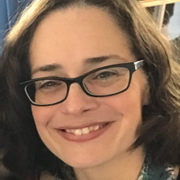- Level Foundation
- المدة 34 ساعات hours
- الطبع بواسطة Wesleyan University
-
Offered by

عن
In Take Action, you will learn four strategies for transforming your activist work into policy change. First, we'll explore how to use the courts to mobilize constituents, raise awareness, gain information, and change the law. Second, we'll analyze the benefits of communicating your message across platforms and review a case study in cross-platform communication of a criminal justice reform message in the U.S. Third, we'll examine how to connect to power through stakeholder analysis and issue framing. Fourth, we'll appraise the benefits of working locally to generate wins, gain knowledge, and create meaningful change. By the end of this course, you will be able to formulate a comprehensive plan for real world change. This course will engage you if you care about specific issues such as climate change, racial justice, or mass incarceration, or if you want a broader understanding of how the U.S. courts and justice system operate, how communications professionals think about social media strategy, how change-makers network with policymakers, or how local actors and positive deviants possess answers to complex social problems. LEARNING OUTCOMES -Recognize and explain policymaking terms -Describe important policymaking places, people, and procedures -Analyze law and policy documents and texts -Evaluate the efficiency and effectiveness of policymaking actors and institutions -Appraise the effectiveness of policy-oriented communications -Identify policy stakeholders -Communicate your policy-related ideas clearly -Develop a plan of action to influence policy INSTRUCTORS Mary Alice Haddad, John E. Andrus Professor of Government; Professor, East Asian Studies; Professor, College of the Environment Sarah Ryan, Attorney, Director of the Law Librarianship Program at the University of North Texas, and Associate Professor of Information Scienceالوحدات
Course Introduction
4
Videos
- Welcome! Take Action--Professors Haddad and Ryan
- Prof. Haddad, The Connected Stakeholder Model
- Khan Academy, Public Policy Process
- The Power of Protest with Professor Allyson Hobbs
2
Readings
- Haddad, The Connected Stakeholder Model: How Advocates Influence Policy
- Chu, How a North Carolina Minister Sowed Seeds of Hope in a Food Desert
Part 1: Why the U.S. Courts Matter and How to Use Them
1
Assignment
- Why the U.S. Courts Matter and How to Use Them
1
Peer Review
- Visit a Court and Watch a Hearing
2
Videos
- Prof. Ryan, Use the Courts: Why They Matter and How to Use Them
- Judge Pratt, How Judges Can Show Respect
2
Readings
- NeJaime, Winning through Losing
- IJIS Institute, Courts 101: An understanding of the court system
Part 2: Case Study: Use of the Courts for Environmental Advocacy
1
Assignment
- Clean Air Act
3
Videos
- Prof. Haddad, Courts and Environmental Advocacy
- Maru, How to Put the Power of Law in People's Hands
- Elizabeth Fisher: A Short Introduction to Environmental Law
6
Readings
- Preston, The Contribution of the Courts in Tackling Climate Change
- Lazarus, The National Environmental Policy Act in the U.S. Supreme Court
- United Nations Environment Programme, The Status of Climate Change Litigation – A Global Review
- WBUR-NPR, How The Supreme Court Made 'Climate History' In Massachusetts V. EPA
- Watch Erin Brockovich (optional)
- & Application Activity: Browse the Clean Air Act and Complete the Quiz Below
Part 1: Why Reaching Multiple Audiences Matters
1
Peer Review
- Evaluate a Changemaker Organization's Cross-platform Communication
2
Videos
- Prof. Haddad, Communicating across Platforms
- Karen McAlister: Advocacy Through Social Media Why Trending Topics Matter
3
Readings
- Kpienbaareh, The Rise of the Fourth Estate
- The Nonprofit Times, Facebook, Twitter Lead NPO Social Media Worldwide
- Vikings PR, Vikings to Bring Awareness to Social Justice Issues During Home Opener vs. Green Bay
Part 2: Case Study: First Step Act Advocacy
1
Peer Review
- Compare and Contrast Ryan's Law Review and Op-Ed Communications
2
Videos
- Prof. Ryan, Communicate across Platforms
- Nicholas Love: Social Media Writing
4
Readings
- Ryan, Judicial Authority under the First Step Act What Congress Conferred through Section 404
- Brennan Center, Ensuring justice and public safety federal criminal justice priorities for 2020 and Beyond (2020)
- Fuchs, Law to Reduce Crack Cocaine Sentences Leaves Some Imprisoned
- Ryan, Why Justice Still Eludes Crack Offenders
Part 1: Finding Stakeholders and Allies
1
Peer Review
- Stakeholder Chart
2
Videos
- Prof. Ryan, Connect to Power
- Rev. Willie T. Barrow
4
Readings
- Raum, A framework for integrating systematic stakeholder analysis in ecosystem services research
- Savina, Complete Stakeholder Mapping Guide
- Community Tool Box, Involving Key Influentials in the Initiative
- Stern, The Stranger Who Changed My Life: The Taxi Driver and the Doctor
Part 2: Issue Framing--Connecting to stakeholders and decisionmakers
1
Peer Review
- Cultivate Allies and Convince Opponents to Support your Position
2
Videos
- Prof. Haddad, Cultivating Allies in Power
- Hayho, Talking about Climate
3
Readings
- Mertha, China's Water Warriors
- Azcarte, How public servants can engage unlikely allies to deliver climate policies
- Thompson, Let’s Change The Way We Talk About Climate Change
Part 1: Make your policy idea work locally, and then spread the idea
1
Peer Review
- Analyze Local Organization's Strategies of Institutionalization, Incremental Innovation, Seizing Political Opportunity, and Networking
2
Videos
- Prof. Haddad, Make It Work Locally
- Carter, Greening the Ghetto
3
Readings
- Haddad, Make It Work Locally: Local Models, Global Solutions
- Maeda, Reducing waste . . . Replicating Surabaya’s solid waste management model
- Miller, The Best Little Art Colony in Texas
Part 2: Think Global, Work Local: Positive Deviance & Other Tools
1
Peer Review
- Turning Protest into Policy: Brainstorming Small Changes
2
Videos
- Prof. Ryan, Work Locally
- Raj Jayadev, Community-powered Criminal Justice Reform
3
Readings
- Sharfique, Positive deviance as a novel tool in malaria control and elimination: methodology, qualitative assessment and future potential
- Blochowiak, Using the PD Framework in the School District of Menomonee Falls, Wisconsin
- Lara, Suspending to Mentorship- How to Curb the School-to-Prison Pipeline
A Plan for Action
1
Peer Review
- Final Paper: Your Plan for Policy Change
2
Videos
- Prof. Haddad, Take Action--From Protest To Policy
- Prof. Ryan, Putting it All Together
Auto Summary
"Take Action: From Protest to Policy" is a dynamic course designed to empower activists and change-makers with the tools necessary to transform advocacy into tangible policy changes. This comprehensive program delves into four pivotal strategies: leveraging the courts for change, effective cross-platform communication, connecting with power through stakeholder analysis, and the importance of local action. Expertly instructed by Mary Alice Haddad, an esteemed professor of government, and Sarah Ryan, an accomplished attorney and professor, this course provides a robust understanding of the U.S. justice system, policymaking processes, and strategic communication. Ideal for those passionate about issues like climate change, racial justice, or mass incarceration, this course also benefits individuals seeking a broader grasp of policy influence. Learners will gain skills in recognizing policymaking terms, evaluating law and policy documents, assessing the effectiveness of policy communications, and developing actionable plans to influence policy. Offered through Coursera, this foundational-level course spans 2040 minutes and is available under Starter and Professional subscription plans. It is perfect for anyone eager to turn their advocacy into impactful policy change.

Sarah Ryan

Mary Alice Haddad


